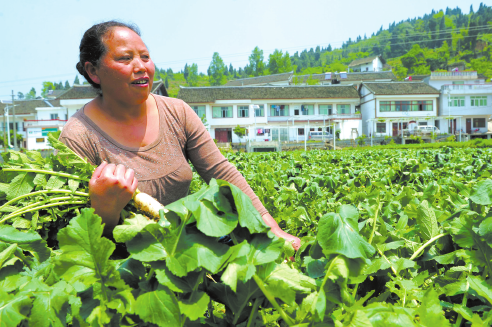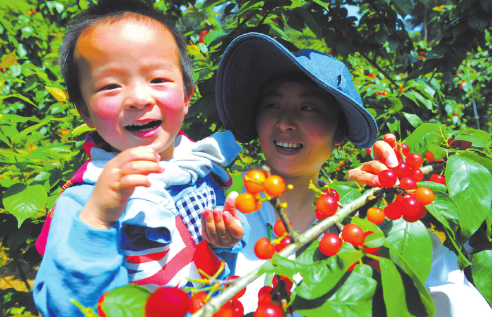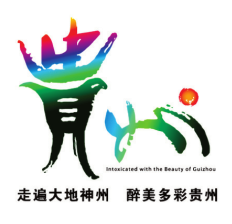Villages transformed by rural tourism
By Zhao Kai| China Daily|Updated: June 25, 2014
Farmers cultivate new travel business to beat poverty and improve lifestyle
Lei Mingying, a 51-year-old farmer from Xingfu village in Xifeng county, Guizhou province, started her working day by answering phone calls for the family inn she runs with her husband.
"I was called by a travel agency that wanted to book rooms," she said.
Lei said the village had attracted more tourists in recent years due to the improved environment and infrastructure.
 |
| A woman works in a vegetable farm in Xingfu village, behind her are white-walled houses with grey tiles.(Photo/CHINA DAILY) |
She said a group of travelers from Chongqing just booked five rooms for their summer vacation in the hillside village, which is dotted with white walled houses with gray tiles.
The village has 2,043 residents, some of which quit their traditional farming jobs to go into the travel business and others decided to lease their land and work in companies in the village, Lei said.
She said there are 15 family inns, five companies and several farming cooperatives in the village.
In 2012 the villagers started to develop rural tourism and established modern vegetable farms and orchards to combat poverty and improve quality of life. In recent years, many migrant workers who had left the village decided to return home to explore the new opportunities.
"A few people in the village run their own inns and restaurants and the majority of villagers have joined cooperatives or companies for efficient, organic farming," Lei said.
Lei was among the first few to take a risk and run her own businesses and her family was the first in Xingfu to develop a mushroom farm. The family now earns more than 50,000 yuan from the farm, a figure much higher than the average income of a family in the neighborhood.
However mushrooms are not her only source of family income.
 |
|
Residents from nearby cities come to Xingfu to pick fresh fruits in one of the orchards..(Photo/CHINA DAILY) |
Rural tourism
In 2013 Lei started to run a family inn in response to a call from village officials to develop rural tourism.
"We didn't expect anyone to come a few years ago. The environment here was undesirable for tourism," she said.
The village is now a favored location for tourists from nearby cities to spend their summer due to the cool weather, improved environment and easy access to neighboring scenic areas, another local resident said.
Lei said during peak season she had to hire a worker from a nearby village to help and paid him 100 yuan a day.
He Song, a 64-year-old who is head of the village, witnessed the village's transformation from poverty to prosperity and said annual income per capita in Xingfu surpassed 10,000 yuan last year.
He said the government's support and assistance played a crucial role in relieving poverty and improving quality of life in Xingfu and other villages.
He said in the past the village had no road access and sanitation was really bad. He recalled the days when sewage and agricultural wastewater mixed together and made the environment extremely unpleasant.
In 2013, the provincial government of Guizhou started a campaign to build xiaokang, or well-off villages, in the province. Governments at various levels invested in the project to improve the environment and build infrastructure.
He said Xingfu village received 1.1 million yuan worth of funding from the governments.
The funds were used to renovate houses and build agriculture, sanitation and road facilities.
The village has developed a modern agriculture system, which combines both farming and sightseeing, He said courtyard grape plantations and kiwi fruit orchards were new tourist attractions.
Xingfu's improved infrastructure has also caught the attention of investors across the country.
Investors from Taiwan and Shenzhen are in discussions with the local government and businesses to explore the possibility of investing in modern, eco-friendly farms in Xingfu and neighboring villages, according to Han Yuanqin, chief of the Yonglongsi township, where Xingfu village is located.
Han said that more villages were following in Xingfu's footsteps by developing modern agriculture and rural tourism.
Another example
He said Hongyan village used to be known as one of the poorest villages in the county but transformed from poverty to prosperity due to the development of grape plantations in recent years.
"Some of the villagers used to sell blood to make a living in the past," said Zeng Qingbin, a 67-year-old Hongyan resident who started planting grapes in 1973.
Zeng said his grape business was hard work but it had finally paid off.
"I used to be the only one in our village in the business. I learnt the skills when I worked outside the village," he said.
"The business was hard for me until the government offered to help with fund raising, information and marketing promotions in recent years," Zeng said.
Every household in Hongyan village has their own grape plantation now and the total planted area is more than 600 hectares.
Zeng said a milestone in the village's grape business was the establishment of a grape cooperative, which helps farmers sell their products with a combined effort.
He said the grape business was often affected by weather conditions and market fluctuations.
To solve these problems and avoid financial losses the cooperative is in contact with investors to help establish a wine factory in the village.
"The wine factory will definitely take us to the next step of development. When the market is bad we can just produce wine instead of selling grapes at a cheap price," Zeng said.
He said the village had changed for the better and that many people who left because of poverty and bad living conditions had now returned.
The county government of Xifeng invested 8.76 million yuan to improve rural infrastructure by the end of April, according to Zhong Yang, the county's party chief.
He said further investment plans were in the pipeline to help more villagers improve their quality of life by the end of 2020.





